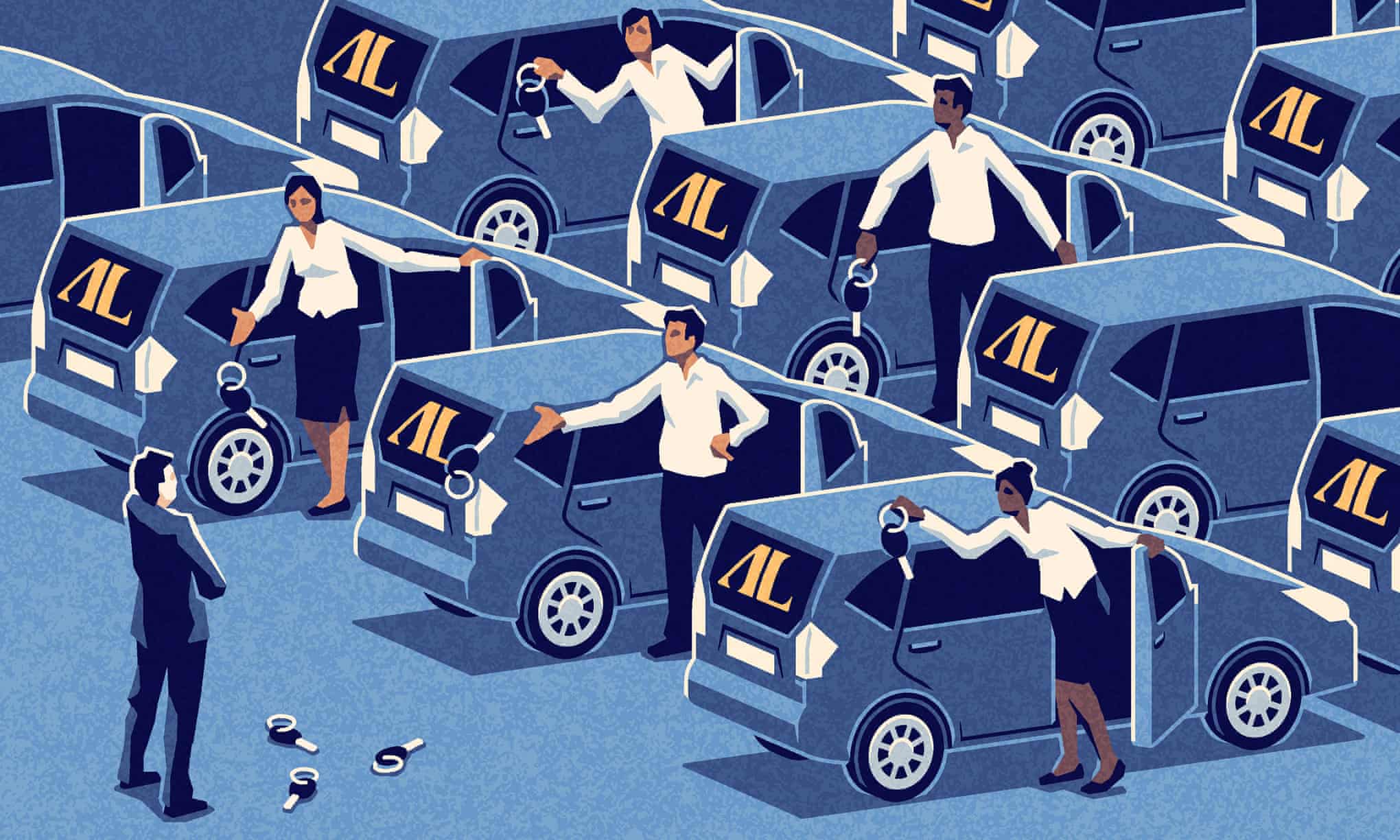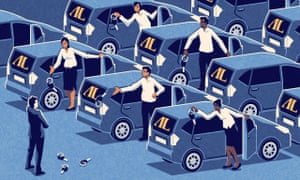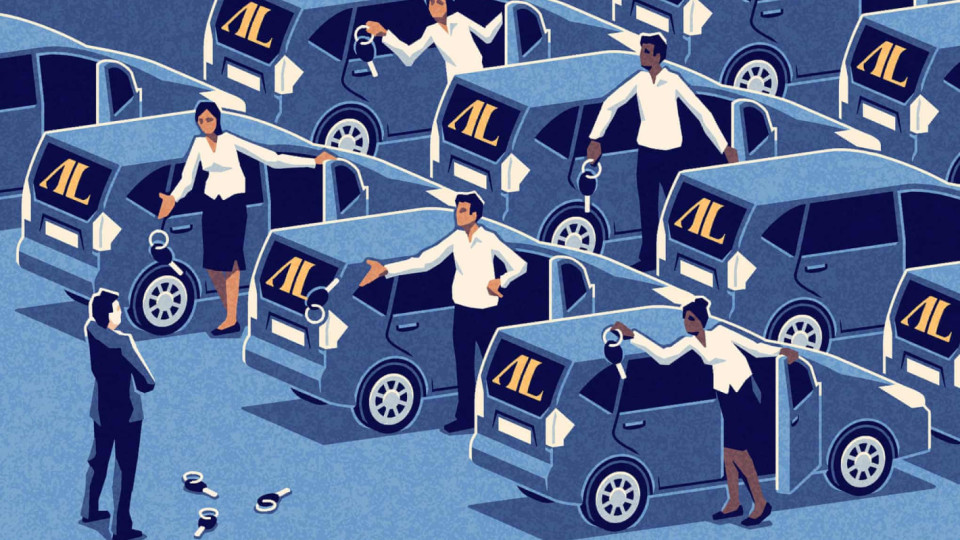

For a lesson in how politics should be done, don’t look at Westminster, as politicians um and ah and slump into their umpteenth mutinous Brexit stalemate. Instead, head 30 miles north to Luton airport, where a bunch of minicab drivers are getting on with the real business of politics: battling to improve their and others’ lives. And in a few weeks they will make history, for the right reasons.
The fight of these 60-odd drivers for Addison Lee looks nothing like the zombie politics of parliament. These aren’t English public schoolboys waging decades-old grudge matches, but working-class cabbies, almost all of Asian origin. They don’t lunch with top journalists but worry about how they’re going to afford the family’s groceries. And their politicking is done not inside a Gothic debating chamber but over post-shift Happy Meals.
The car plants that made this economy have shrunk or died, and what’s left is odds and ends, and bogus self-employment
Yet theirs is truly a tale of Brexit Britain, in its combination of broken institutions, the wreckage of austerity and working poverty. This was the mirror held up to the country in June 2016, and nothing about that picture has changed since. Except the Addison Lee drivers are trying to fix their situation – more seriously than their high-earning representatives at Westminster. A country in collapse should learn and take hope from their story.
It starts at the cab rank straight outside Luton airport. On any given weekday, this mini-roundabout teems with sleek black minicabs, all owned by the chain Addison Lee. Last Thursday afternoon I counted more than 30 cars, engines shut down, drivers kicking their heels. Some had been there for two hours but knew they’d have to wait longer still, because not a single customer came out. Even the gentle sunshine couldn’t cheer up this pathetic scene. All that wax and polish and those men in their mandatory shirts and ties, their hopes for a livelihood and that productive potential: idled, wasted, frustrated.
In Brexit-voting Luton, this is what today’s working class looks like. The car plants that made this economy have either shrunk or died, and what’s left are odds and ends, and bogus self-employment. Such as being a driver-partner at Addison Lee, with neither holiday nor sick pay, and no guaranteed income. The cab giant has twice been ordered by an employment tribunal that its drivers should be treated as “workers”, with better rights, but it keeps appealing against the judgments. The upshot is that if these guys earn no money, that’s entirely on them; so they pull longer and longer shifts, stuck on this roundabout.
Guys such as Imran Iqbal, with a small family who he never sees because he works up to 10 hours a day, seven days a week. He managed to survive on that until Addison Lee jacked up the rent it charges for his car to £220 a week, and last winter increased its commission from the previous 30% to 35% of all his fares. They raised passengers’ fares too, but the result has nearly broken him. His payslips for the past few weeks show that one week early in March, the company’s cut was so big that he was left with £161 for 65 hours’ work: a fraction of the legal minimum wage. The following week was even worse: after all the deductions he took no money home but owed Addison Lee £35. The company claims that average pay for this calendar year will have risen, given the expected summer rush. But with the higher fees, the drivers see little prospect of that.
Iqbal came to cabbing from one of the area’s now defunct factories. In 1995, at the end of a four-day week, he’d walk away with £250, or £330 in current money. Today, he earns less than he did almost a quarter of a century ago. The result is that the family borrow on high-interest credit cards to pay their mortgage; that he and his wife regularly bicker; that this 43-year-old former body-builder is already clocking up high blood pressure, cholesterol problems, stress …
But he remains proud, in little ways that break your heart. We sit in the neat front room of his small house, as he pours tea from a pot and serves a tray of freshly fried samosas. Then he admits that there are no savings, and that his boy, about to graduate, is more than £30,000 in debt. “I can’t see a future,” he says, and for once the mask slips. “I’m trapped. All the drivers are trapped.”
What this reflects is a gross imbalance of power between capital and labour, between a taxi firm owned by the multibillion-pound Carlyle private-equity group and a bunch of men stuck in the gig economy.
The drivers allege that local managers sometimes call drivers not by their names but by whistling (“like we’re sheepdogs,” says one). Those who complain say they have been told that they can hand their keys in and go. A year ago the largely Muslim workforce was promised a prayer room, but on my visit there was nothing, and drivers were praying on that mini-roundabout. Addison Lee did not respond to queries about the absent prayer room.
“I’m treated like a piece of shit,” says driver Zubair Chaudhry. Responding, Addison Lee told me: “We have had no complaint about management behaviour at Luton … We would ask any driver to report any behaviour they believe is unacceptable.” Yet I’ve seen complaints about bullying that have been sent to the chief executive that the company confirmed had not been acted upon.
This is what Labour leave-land looks like: not the working-men’s clubs and cut-price bitter of BBC vox pops, but insecure jobs and a public sector that looks the other way. It is a landscape that affords no protection to those who need it, which robs those who are poorest and where once-trusted institutions have been smashed into rubble. The airport’s sole owner is Luton council, which is as cash-strapped as anywhere else in local government. It leased the cab rank to Addison Lee in 2012 for a reported £2m, and wrote to taxi drivers encouraging them to sign up with the firm. The conflict of interests is ugly, yet the council claims it will investigate complaints “and consider whether the conduct impacts upon [Addison Lee’s] suitability to hold a licence”.
Rather than wait for others to ride to their rescue, drivers last autumn joined a branch of the tiny Independent Workers of Great Britain trade union. Such organising is a rarity in the gig economy, where workers are often pitted against each other on an app, but that mini-roundabout of perpetual waiting is perfect for recruitment drives.
Being in a union has already upended the power dynamic. Acting in concert, the drivers have done go-slows, bringing the town centre to a standstill by driving at glacial speed. On 1 May they will stage the first official strike ever held by gig economy workers. Where Uber drivers and Deliveroo couriers have previously just not turned up for work, the Addison Lee drivers have organised, balloted and 92% of them voted for industrial action.
After decades of smooth-cheeked consensus politicians and technocratic management, the UK has forgotten how to argue politically, which explains part of the great crack-up we are now living through. We have scrapped or weakened the institutions (unions, councils, local papers) that used to collectivise our discontents and pursue them. To all that, the drivers have responded by building a new institution. These first- and second-generation immigrants aren’t the transients and undercutters of racist myth. With considerable courage, they are working to improve this country.
I ask Iqbal: “Aren’t you worried about what your family’s going to live on while you’re off work?” He looks at me levelly. “To gain something we have to lose something,” he says. “Someone has to make a sacrifice for the next ones.”
The Guardian











Leave a comment